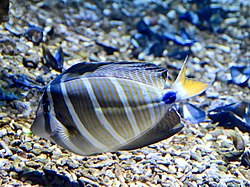Biology:Zebrasoma
| Zebrasoma | |
|---|---|

| |
| Zebrasoma velifer | |
| Scientific classification | |
| Domain: | Eukaryota |
| Kingdom: | Animalia |
| Phylum: | Chordata |
| Class: | Actinopterygii |
| Order: | Acanthuriformes |
| Family: | Acanthuridae |
| Tribe: | Zebrasomini |
| Genus: | Zebrasoma Swainson, 1839 |
| Type species | |
| Acanthurus velifer Bloch, 1795[1]
| |
| Species | |
|
7, see text | |
| Synonyms[1] | |
| |
Zebrasoma is a genus of marine ray-finned fishes belonging to the family Acanthuridae which includes the surgeonfishes, unicornfishes and tangs. These fishes are found in the Indo-Pacific region.
Taxonomy
Zebrasoma was first proposed as a monotypic subgenus of Acanthurus in 1839 by the English zoologist William John Swainson with Acanthurus velifer, which had been described by Marcus Elieser Bloch from India in 1795, as its only species.[1][2] The seven species within the genus form a number of apparent clades. The striped clade is probably the most basal and includes Z. desjardinii and Z. velifer, these two often being regarded as conspecific. Z. gemmatum is regarded as being on a monospecific clade between the basal striped clade and the others. The remaining two higher clades are species pairs, one made up of Z. flavescens and Z. scopas, and the other of Z. rostratum and Z. xanthurum.[3] The genera Zebrasoma and Paracanthurus make up the tribe Zebrasomini within the subfamily Acanthurinae in the family Acanthuridae, according to the 5th edition of Fishes of the World.[4]
Etymology
Zebrasoma combines soma, meaning "body", with zebra, referring to zebra stripes on the body of the type species, Z. velifer.[5]
Species
Zebrasoma currently has seven recognised species classified within it:[6]
- Zebrasoma desjardinii (E. T. Bennett, 1836) (Desjardin's sailfin tang)
- Zebrasoma flavescens (E. T. Bennett, 1828) (Yellow tang)
- Zebrasoma gemmatum (Valenciennes, 1835) (Gem tang)
- Zebrasoma rostratum (Günther, 1875) (Black tang)
- Zebrasoma scopas (G. Cuvier, 1829) (Twotone tang)
- Zebrasoma velifer (Bloch, 1795) (Sailfin tang)
- Zebrasoma xanthurum (Blyth, 1852) (Purple tang)
Characteristics
Zebrasoma tangs have deep bodies and pointed snouts with high dorsal, supported by 4 or 5 spines and between 23 and 31 soft rays, and anal fins, supported by 3 spines and between 19 and 25 soft rays. The pectoral fins have between 14 and 17 fin rays while the pelvic fins have a single spine and 5 soft rays. The caudal fin is truncate.[7] The smallest species in the genus is the yellow tang (Z. flavescens) with a maximum published total length of 20 cm (7.9 in) while the largest species are Z. scopas and Z. velifer each with a maximum published standard length of 40 cm (16 in).[6]
Distribution
Zebrasoma tangs are found in the Indian and Pacific Oceans including the Red Sea[7] east to the Pitcairn Islands[8] and Hawaii.[9]
Utilisation
Zebrasoma salifin tangs are regarded as desirable aquarium fish due to their adaptability, largely peaceful nature and feeding habits.[9]
References
- ↑ Jump up to: 1.0 1.1 1.2 Eschmeyer, William N.; Fricke, Ron; van der Laan, Richard, eds. "Genera in the family Acanthuridae". California Academy of Sciences. http://researcharchive.calacademy.org/research/ichthyology/catalog/fishcatget.asp?tbl=genus&family=Acanthuridae.
- ↑ Eschmeyer, William N.; Fricke, Ron; van der Laan, Richard, eds. "Species in the genus Zebrasoma". California Academy of Sciences. http://researcharchive.calacademy.org/research/ichthyology/catalog/fishcatget.asp?tbl=species&genus=Zebrasoma.
- ↑ Radu C. Guiasu; Richard Winterbottom (1993). "Osteological Evidence for the Phylogeny of Recent Genera of Surgeonfishes (Percomorpha, Acanthuridae)". Copeia 1993 (2): 300-312. doi:10.2307/1447130.
- ↑ J. S. Nelson; T. C. Grande; M. V. H. Wilson (2016). Fishes of the World (5th ed.). Wiley. pp. 497-502. ISBN 978-1-118-34233-6.
- ↑ Christopher Scharpf; Kenneth J. Lazara, eds (12 January 2021). "Order ACANTHURIFORMES (part 2): Families EPHIPPIDAE, LEIOGNATHIDAE, SCATOPHAGIDAE, ANTIGONIIDAE, SIGANIDAE, CAPROIDAE, LUVARIDAE, ZANCLIDAE and ACANTHURIDAE". The ETYFish Project Fish Name Etymology Database. Christopher Scharpf and Kenneth J. Lazara. https://etyfish.org/acanthuriformes2/.
- ↑ Jump up to: 6.0 6.1 Froese, Rainer and Pauly, Daniel, eds. (2023). Species of Zebrasoma in FishBase. June 2023 version.
- ↑ Jump up to: 7.0 7.1 John E. Randall (2022). "Family Acanthuridae". Coastal Fishes of the Western Indian Ocean. 5. South African Institute for Aquatic Biodiversity. pp. 219–244. ISBN 978-1-990951-32-9. https://saiab.ac.za/wp-content/uploads/2022/11/1._wiof_volume_5_text.pdf. Retrieved 2023-07-17.
- ↑ Froese, Rainer and Pauly, Daniel, eds. (2023). "Zebrasoma rostratum" in FishBase. June 2023 version.
- ↑ Jump up to: 9.0 9.1 Bob Fenner. "The Sailfin Tangs, Surgeons, Doctorfishes, of the Genus Zebrasoma". http://www.wetwebmedia.com/zebrasom.htm.
External links
Wikidata ☰ Q1551152 entry
 |

